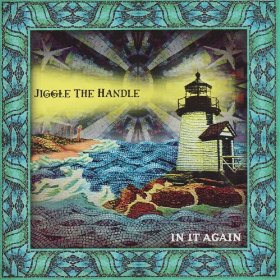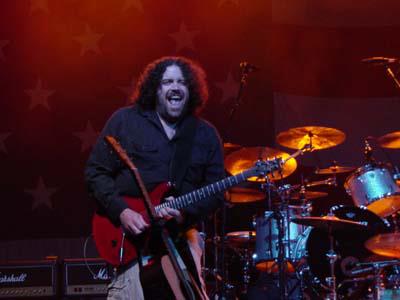Gary Backstrom: In It Again with Jiggle

If you know Jiggle, than you can probably remember a time – during the heady days of the mid-to-late 90s and early 00s – when on a good night it felt like a regional jamband like this one could conquer the world.
Gary Backstrom, lead guitarist and vocalist for the New England based band and its sole link to its 1989 roots as All You Can Eat, definitely remembers. Not only does Backstrom remain a vital member of the Northeast music scene with his own bands and a raft of newer projects, but he also stays in close enough touch with his former Jiggle mates to re-light the torch every once in a while. Jiggle will once again come together this month for two shows, May 23 at South Shore Music Hall in Quincy, Mass., and May 24 at StrangeCreek.
(Backstrom, who lives in Gloucester, Mass., believes in passing the torch, too. All three of his kids – Sadie, 13, Nora, 11 and Jonah, 8 – are musical, and along with dad sing in a Boston-area Americana folk chorus called Family Folk Chorale.)
We caught up with Backstrom to take us through his full plate of current projects.
It’s awesome to see you returning to Jiggle, at least every so often. Why is now the right time for the next reunion shows?
We ended up doing a reunion in 2008 at Strange Creek, and I can’t remember what spawned it but it was a lot of fun. And I know there was a show last year where Mark [Blanchette, StrangeCreek organizer] said, hey, I’ve got this anniversary show coming up in November [at Mill Street Brews in Southbridge, Mass.] and wouldn’t it be fun if we had Jiggle play? So it’s always like that: someone has an idea and we see if we can do and I ask everybody.
Everyone’s usually on board but the tough thing we have going is that [keyboardist] Paul Wolstencroft is with Slightly Stoopid, so it’s really hard to pin him down. So we’ve been using Dave Osoff, who was the original keyboard player for Jiggle in the 1990 to 1995 incarnation of the band.
Why do we do it? It just always seems like a good excuse. I mean, as you get older, people start dropping dead and we’re always saying to ourselves, maybe we should try this again. So I put some feelers out there on the Internet about whether there’d be interest in these shows, and after the [November] show, there was talk about doing it again in May. So that was the prompt. Mark was a big catalyst.
Does that renewed interest surprise you? Jiggle wasn’t a massive band but you guys are definitely known in the scene.
You know, it’s like the longer you stay in the game without completely disappearing, the more of a fixture you become to people. I know that’s the case with Max Creek, for example – I mean, I saw them in high school. It’s something that you’re happy knowing is still there. I can go visit it when I want to, and it makes you feel good, because so many things change. Maybe you’re going to fade into the woodwork one of these days, so your thought is that you try to keep it out there and maybe, if you’re lucky, people come back to you and they say, “Oh, wow, you’re still here. Hey, it’s great to see you.”
At the last Jiggle reunion show, the entire audience sang the lyrics to the songs louder than the band could sing, even the changed lyrics and all the verses. It was cool to hear that. We have some longevity.
If that interest is there, how come you guys don’t do this more often?
I’d have to talk to everyone, but right now it looks like we’re going to try to do it bi-annually, maybe once in the fall and once in the spring. Some of the guys live far away. [Bassist] Chris Q lives in Asheville and Michael Pujato, our percussionist, lives in Nebraska. But I think some regularity could definitely be in the works. Maybe we do these two little shows, we get some more exposure, and next time we do three or four.
Why did Jiggle the Handle wind down in the first place? You guys had pretty good momentum during a period of mushrooming jamband popularity and new fans.
We had been at it for 12 years, and I would guess seven of those were touring nationally. It’s very difficult to make money doing this. And you can get right on the cusp where you’re making some money, but then you get into your 30s and you say to yourself, jeez, I can’t live like this.
I can’t speak for everybody but I know for Greg [Vasso] and me I think we were looking for more financial stability. I never wanted it to stop; I was the guy saying why don’t we try to play two weekends out of the month and keep it going. But we had a split down the middle where some people wanted to do whatever they were going to do full time. Some of us needed a little more stability. I was having a baby and you say to yourself that your standard of living has to be higher. It’s hard to live in a tiny one-room apartment when you get to a certain age and want to build a family.
It’s encouraging that all of you have stayed in the game, though.
For anybody – any band – you ask why are you stopping, and the answer is usually that one or two of the band members just didn’t like each other or there were personal issues in the band. We all really liked each other. And we’d see each other at parties and other things. It’s tough, you know?
I mean, I’d be curious what a guy like Scott Murawski has to say. He’s one that’s been in the game for a really long time. I remember at one point hearing he was going to be a computer programmer or something and that he was going to stop doing music, and I was like, “No way! That can’t happen.” And then he kept playing and Creek is still going and he plays with Mike Gordon and he’s played with Oteil and Billy Kreutzmann, and I remember thinking, “Goddamn, that guy deserves that.”

Jiggle was coming up at a very interesting time for the scene. Looking specifically at New England and the Northeast, do you still see a supportive scene like you did then?
I think yeah, in some ways. In other ways, it has changed. There is a ton of new people, but at the same time, it feels smaller. The late 90s and the early 2000s – that was a very big wave, and we were lucky to be part of it. It ebbs and flows, and maybe there are different styles now – more singer/songwriters in the mix. But a lot of people are still around: Max Creek, AOD and some of the folks out there. Some of us have hung out. It’s hard to pin down.
Is the Gary Backstrom Band still a priority?
The GBB has been kind of casual lately. We did do a live CD, but since the members have changed that’s now dated. Hopefully we’ll have another CD this year – it’s going to have some of the older songs of mine that I never recorded with Jiggle, plus a bunch of new ones.
It’s an interesting band. Right now, it’s a two-keyboard, drums and bass lineup, so that’s five of us. We might be adding some percussion and horns in the next year as well. I’ve really gotten into soul music and R&B recently so a lot of the newer stuff I’m doing has a bit of that slant. I’ve spent a lot of time really working on my voice so I can put a product out that’s very vocally strong as well as guitar strong. I’ve done voice lessons and been practicing like crazy.
I don’t see the [GBB] as a totally separate entity from Jiggle and you do hear some past material at Gary Backstrom Band shows. When you write a body of music, you take it with you.
And you have another group you’re working on.
Yes, a Paul Simon tribute we call Rhythm of the Saints. My two keyboard players, Chris Nemitz and Dave Osoff, are in there, and Greg is on drums and Yahuba [Garcia] from Ryan Montbleau Band is on percussion. We also have John Vanderpool from the Heavy Metal Horns and Justin Kleya from Grass Gypsies on bass. For this one we want to take it to small theaters and maybe some more mature audiences. It has a lot of appeal – it’s going really well.
That’s right, I remembered hearing very good things about the Paul Simon show in Arlington [Mass.] a few months ago. How did this come about?
Man, I think the Paul Simon tribute goes all the way back to something we did at, maybe Berkfest? We did a Graceland tribute at one point. I’d been doing a Todd Rundgren tribute a few years ago – I haven’t done that for a while – and my friend Dave Brunyak from the Phreaks was the one who suggested a Paul Simon tribute. I hadn’t thought of that, and I was like, “OK, let’s try it.”
We started as a four piece, and then I was like, I need a big band, and let’s try it at the Regent [in Arlington]. That music is just so, so amazing, and people know it, so they will come out. When you try something like that it’s really hard to find an artist who hasn’t been overdone. There are a lot of Grateful Dead cover bands, and by that I mean, there are enough: I’m not sure I want to add one more when so many people already do an amazing job of it. There are a lot of Allmans cover bands. But I thought Paul Simon was really cool and not being done – it was a fit, and everyone in the band has such a blast doing it. We’re working on some more dates right now.
And your Piano Men project?
It’s a tribute to Elton John and Billy Joel. We’ve been doing this show nationally with a 60-piece orchestra and use the symphony that is in the city that hosts the show. We’ll be doing it in California, Pennsylvania, Maine and Chicago this year.



















